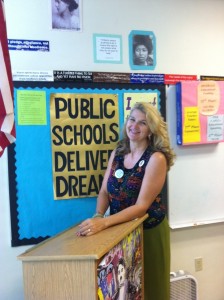How Florida Reading Lists Are Changing For New Common Standards

Sarah Carr / The Hechinger Report
Chris Kirchner, a veteran English teacher at Miami's Coral Reef Senior High School, supports the Common Core in theory, but worries teachers won't have enough support and time to adjust to the new standards.
Editor’s note: This story was written by Sarah Carr for The Hechinger Report.
MIAMI—In Chris Kirchner’s freshman English classes at Coral Reef Senior High School, novels like “To Kill a Mockingbird” and “The Great Gatsby” have been squeezed off the syllabus to make room for nonfiction texts including “The Glass Castle” and “How to Re-Imagine the World.” For the first time, students will read only excerpts of classics like “The Odyssey” and “The House on Mango Street” instead of the entire book. And Kirchner will assign less independent reading at home, but will require students to write more essays, and push them to make connections across multiple texts.
“I’m trying to go big with the change and see what works,” says Kirchner, who has taught English in Miami-Dade schools for more than 30 years.
The “change” Kirchner refers to is the introduction of the Common Core: the education standards adopted by Florida along with 44 other states and the District of Columbia. The standards do not constitute a curriculum, but they lay out general education principles and skills students should master at different grade levels. All Florida public school educators are supposed to start adapting their teaching to the new standards this school year; students will be tested on them for the first time in 2015.
For high school English teachers like Kirchner, the Common Core is prompting consequential and contentious changes in what students read and how the books are taught: The new standards call for a focus on depth over breadth, more challenging readings, and increased emphasis on nonfiction. Students will be expected to make written arguments using specific evidence from reading assignments, often pulling together examples from multiple texts. No longer should teachers ask students to write solely based on their personal experience or opinion—arguing for or against school uniforms, for instance.
“It’s encouraged me to give up some practices I had a great allegiance to,” says Kirchner, “specifically, the teaching of whole novels.”
Several high school English teachers interviewed about the changes say they agree with the standards in theory, particularly the emphasis on critical thinking and close reading. But they worry about the impact on low-income students who are more likely to read below grade level and struggle with the fundamentals of literary analysis (much less making connections across multiple and challenging texts).
“We have great students, intelligent students. It’s just that they are not where they should be,” says Alexandria Martin, an English teacher at Miami Carol City Senior High School, where 80 percent of the students qualify for free and reduced lunch. “Students will eventually rise to the occasion, but it will take some growing pains first.”
Caught between the old and new
One afternoon a month into the school year, Kirchner asked her freshman students what type of reading would be most valued in high school.
With some prodding, Kirchner got the answer she was looking for: Close reading.
Kirchner held her pointer finger and thumb in a circle around her eye like a monocle and buried her face in a book to illustrate the practice. She then asked her students to practice some close reading on their own, analyzing short passages from books including Elie Wiesel’s “Night” for diction, context, main idea, and literary motif.
In previous years, Kirchner would not have asked freshmen to do close reading and textual analysis on their own so early in the school year. “Common Core is more of a discovery-based model,” she says. “The big change is being comfortable letting kids mess up.”
Florida teachers are caught this year between the old way and the new one since students will be tested on the Sunshine State Standards for a final time this spring. Kirchner decided to go full bore with the Common Core, however, and spent much of the summer revamping her syllabus. She was merciless in cutting novels, replacing them with not only nonfiction, but also with short stories and plays. In an attempt to challenge students, she added Shakespeare’s “Twelfth Night” and the play “Cyrano de Bergerac” to the lineup. Instead of writing two papers with citations over the course of the school year, the students will write six.
“Kids who are forced to grow up very quickly are more likely to find it ludicrous to spend a lot of time on why this author chooses one word over another. Contemplating why an author repeats a word three times can almost seem like a hilarious luxury they can’t afford.”
-Chris Kirchner, English teacher at Miami’s Coral Reef Senior High School
Kirchner and other English teachers say they are assigning multiple readings on similar themes so students will be prepared to make connections between different passages on the PARCC exams. The PARCC is a consortium designing tests aligned with the Common Core that several states will likely begin using in 2015. (Florida was an early leader of the consortium, but appears increasingly likely to drop out and develop its own Common-Core aligned assessments at Gov. Rick Scott’s request.)
Adrienne Paone, an English teacher at Pedro Menendez High School in St. Augustine, will assign students a few nonfiction articles on gun control as an accompaniment to the memoir “A Long Way Gone,” which exposes the plight of child soldiers in Africa. And she will assign students multiple texts on the theme of injustice during the unit on “To Kill a Mockingbird,” including Martin Luther King Jr.’s “I Have a Dream” speech. In their writing, students will have to draw on examples across the different texts.
“I’m trying to mimic what I think might happen on the PARCC,” said Paone.
Looking for guidance
Not all Miami-area English teachers have shifted full throttle into Common Core—at least not yet. At Carol City Senior High School, Martin and her colleague Nichole Dino say they are waiting for more guidance from school and district leaders on when, and how, to start teaching the standards.
“They’ve mentioned the different standards and how they look, but there’s been no deep discussion,” said Martin during an interview in September. While many of the teachers at Coral Reef Senior High attended voluntary state-run professional development sessions on the Common Core, Martin and Dino have very few colleagues who went. (Two of their fellow teachers at Carol City planned to attend a district-sponsored session on Common Core and secondary English instruction in October, however.) They hope at least some future sessions include some guidance on teaching Common Core in low-income communities.
“I hope there are experts who’ve worked in schools that look similar to ours,” said Martin. “A lot of times, the people who run PD come from affluent schools,” she said, referring to professional development.

wickerfurniture / Flickr
New Common Core standards have Florida English teachers changing how they teach novels.
When the teachers at Carol City dive into the Core they will face challenges that the staff at Coral Reef—a magnet school where far more of the students come from middle-class families—do not have to worry about.
At Coral Reef, Kirchner can easily make changes to her reading assignments because she knows most of the students can afford to buy the books on their own. But at Carol City, Martin and Dino know several of their students could not shoulder an additional expense; the teachers have to wait for the school to obtain the books before requiring a text (not always a quick or easy process).
Moreover, a higher percentage of students at Carol City read below grade level, making it harder to introduce more challenging texts. Martin and Dino were surprised when they saw a list of recommended readings for different grade levels under the new standards. Chinua Achebe’s “Things Fall Apart,” which Dino reads with her 12th graders, was listed under ninth grade. The “Narrative of the Life of Frederick Douglass” and poems by Walt Whitman and Robert Frost, which the teachers currently introduce in high school, were labeled middle-school texts.
The Carol City teachers also worry that many of their students will struggle to make the leap to the more formal and sophisticated approach to literary analysis the standards call for. The students tend to prefer authors they can relate to, and many of them like writing first-person narratives more than evidence-based analysis. They loved Edgar Allen Poe, for instance, not for his use of language, but because they could understand “why he would write so dark” based on learning the details of his tragic life, said Dino.
“They like things that hit close to home,” said Martin.
Even though she now teaches in a school dominated by students from middle-class homes, Kirchner can understand the other teachers’ concerns since she worked in high-poverty schools for several years.
Kirchner supports the Common Core overall. But she adds that the Core’s emphasis on dispassionate, deliberate analysis is somewhat at odds with a quickness of mind and emotional intelligence that tend to be strengths of students growing up in “hard environments.”
“Kids who are forced to grow up very quickly are more likely to find it ludicrous to spend a lot of time on why this author chooses one word over another,” Kirchner said. “Contemplating why an author repeats a word three times can almost seem like a hilarious luxury they can’t afford.”
This story was produced by The Hechinger Report, a nonprofit, nonpartisan education-news outlet affiliated with Teachers College, Columbia University.

